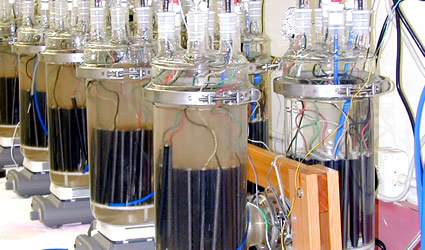Un gruppo di scienziati greci sta lavorando a un sistema bio-elettrochimico di celle a combustibile microbiche che utilizza i batteri per trasformare le acque reflue in elettricità, un progetto certamente ambizioso che è in fase di sviluppo grazie anche alla collaborazione di alcuni ricercatori britannici e, soprattutto, ai finanziamenti allo scopo erogati dalla Hellenic Foundation for Research & Innovation, che ha sede ad Atene.
Scopo della ricerca è la realizzazione di celle a combustibile microbiche, cioè sistemi bio-elettrochimici che utilizzano i batteri per convertire i composti organici e inorganici presenti nelle acque reflue alo scopo di generare elettricità.
Al momento, questa embrionale tecnologia viene testata in laboratorio con il sostegno del Governo greco e della Banca europea per gli investimenti, che ha erogato un prestito di 180 milioni di euro alla Fondazione ellenica nel quadro della partecipazione agli sforzi profusi per il raggiungimento degli obiettivi climatici posti a livello internazionale.
Una sfida raccolta da ricercatori di diversi istituti riconducibili a tre università, coordinati dalla dottoressa Asimina Tremouli, del Dipartimento di sintesi e sviluppo dei processi Industriali presso la National Technical University di Atene.
Un successo in questo campo rappresenterebbe un’alternativa sostenibile al trattamento delle acque reflue in grado di contribuire alla riduzione dell’inquinamento ambientale.
La cellula a combustibile microbica è composta da un anodo e un catodo fisicamente separati da una membrana. I microrganismi presenti nell’anodo ossidano le sostanze organiche sottostanti che sono presenti nelle acque reflue, rilasciando protoni ed elettroni come parte della loro respirazione anaerobica. I protoni fluiscono successivamente attraverso la membrana nell’elettrodo catodico, mentre gli elettroni scorrono attraverso il circuito esterno, generando così un flusso di corrente elettrica.
I risultati ottenuti nella ricerca parrebbero promettenti e la tecnologia, la cui fase sperimentale dovrebbe essere completata nei prossimi cinque anni, potrebbe essere integrata negli impianti di trattamento delle acque reflue esistenti o utilizzata nella forma di singola unità di potenza.
Inoltre, una sua possibile futura applicazione potrebbe essere quella di sistema decentrato in aree isolate non sono collegate alle reti fognarie dei centri urbani, oppure in piccole comunità con meno di duemila abitanti, nelle quali le infrastrutture elettriche spesso risultano insufficienti al fabbisogno locale, con una riduzione del ricorso a combustibili fossili per l’elettrogenerazione.
Clean energy from wastewater. By Antonella Santi, 29 January 2020 – Scientists from the Hellenic Foundation in Athens are working on a bio-electrochemical system of microbial fuel cells that uses bacteria to turn sewage into electricity
To create renewable energy from wastewater. That’s the ambitious project of Greek scientists, in collaboration with UK researchers, funded by the Hellenic Foundation for Research & Innovation in Athens. The scientists are developing “microbial fuel cells”, bio-electrochemical systems that use bacteria to convert organic and inorganic compounds found in wastewater, to produce electricity.
The Greek team is testing the technology with the backing of a loan to the Hellenic Foundation from the European Investment Bank. It’s the kind of innovative product that will be needed to meet international climate targets.
The project brings together researchers from different fields to tackle daunting scientific and technological challenges and involves three universities: the National Technical University of Athens, the School of Sciences of the National and Kapodistrian University of Athens and the Bristol BioEnergy Centre at the University of the West of England.
“Any efforts to develop and implement strategies for resource recovery, renewable energy generation or a more efficient use of existing resources are very important,” says Asimina Tremouli, researcher in the Department of Synthesis and Development of Industrial Processes at the National Technical University of Athens School of Chemical Engineering, who’s the Principal Investigator of the project.
The researchers’ earlier designs experienced electrochemical losses that limited the overall performance of the system. Now they’re introducing new materials to reduce implementation costs.
The new design model would represent a sustainable alternative to wastewater treatment and contribute to reduced pollution.
What is a microbial fuel cell?
Backed by a euro 180-million loan from the European Investment Bank signed in 2016 as well as Greek government financing, the Hellenic Foundation is running a range of research proposals from talented young scientists.
Here’s how the microbial fuel cell works.
The cell consists of an anode and a cathode, physically separated by a membrane. Microorganisms in the anode oxidise the underlying organic substances present in the wastewater, releasing protons and electrons as part of their anaerobic respiration. Protons flow through the membrane into the cathode electrode and electrons flow through the external circuit, producing a flow of electric current.
The multidisciplinary team is working to optimise a high-yield microbial fuel cell, which could be replicated to create a stack of cells. Asimina Tremouli calls these “smart stacks,” because of a unique feature that prevents the voltage being reversed, as often happens when electron devices are connected. The smart stack would enable a scale-up of the technology, together with possible commercialisation on a wide scale. This would be accomplished by joining significant “know-how” provided by the National Technical University of Athens (for its innovative design and materials) and the School of Sciences of the National and Kapodistrian University of Athens (for its materials) and University of the West of England (for its materials and stacking strategies)
Forget fossil fuels
The results provided by the new microbial fuel cells are quite promising and the technology, whose test phase should be completed in the next five years, could be integrated into existing wastewater treatment plants or work as individual power units. It could also serve as a decentralised system in isolated areas that aren’t connected to municipal sewage networks or in small communities with less than 2,000 inhabitants where electrical infrastructure is often insufficient.
As well as cutting fossil fuel use, the decentralised options would boost local economies and create jobs.








